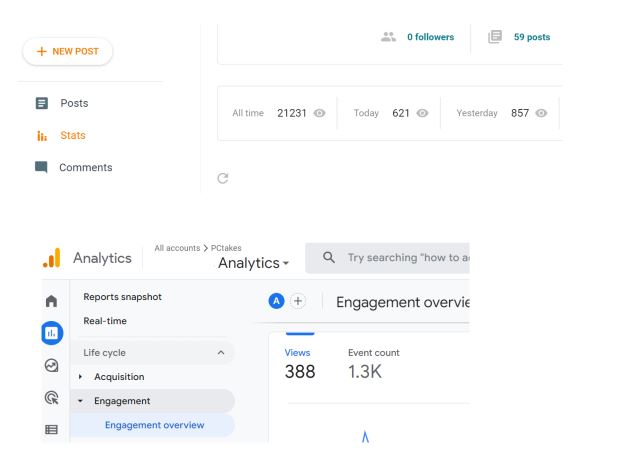If you run a blog, you may be familiar with the various tools available for tracking and measuring your blog’s performance. Google Blogger and Google Analytics are two popular options that many bloggers use to track their traffic and measure the success of their content. However, you may have noticed that the data provided by these two tools can be different, even when tracking the same blog. In this post, we’ll explore the reasons why Google Blogger stats and Google Analytics stats may be different and how to make sense of these discrepancies.

Why Blogger Stats and Google Analytics Stats May Be Different
- Different data sources: One reason why Google Blogger stats and Google Analytics stats may be different is because they come from different sources. Google Blogger stats are provided by the Blogger platform itself, while Google Analytics stats are collected by the Google Analytics tool, which is a separate service.
- Different data points tracked: Google Blogger stats and Google Analytics stats may track different data points, such as page views, unique visitors, and session duration. Google Blogger stats may also include data on specific posts or pages, while Google Analytics stats may provide more detailed information about the behavior of individual visitors.
- Different definitions of key terms: Google Blogger stats and Google Analytics stats may use different definitions for key terms such as “page view” or “unique visitor.” This can lead to discrepancies between the two sets of data, as the same term may be measured differently by each platform.
- Different tracking methods: Google Blogger stats and Google Analytics stats may use different methods of tracking data, such as cookies or IP addresses. This can lead to differences in the data collected, as some methods may be more accurate or comprehensive than others.
- Different sampling methods: Google Blogger stats and Google Analytics stats may use different sampling methods to collect data. For example, Google Analytics may use sampling to estimate traffic on a website, while Google Blogger may use a different method to track data.
- Different time frames: Google Blogger stats and Google Analytics stats may use different time frames for tracking data. For example, Google Blogger stats may track data on a daily or weekly basis, while Google Analytics stats may track data on a monthly or annual basis.
- Different data filters: Google Blogger stats and Google Analytics stats may use different filters to exclude certain types of traffic from their data. For example, Google Analytics may exclude traffic from certain countries or regions, while Google Blogger may exclude certain types of bots or crawlers.
- Different data sources: Google Blogger stats and Google Analytics stats may use different sources of data, such as server logs or JavaScript tracking codes. This can lead to differences in the data collected, as different sources may have different limitations or biases.
- Different data processing: Google Blogger stats and Google Analytics stats may use different methods of processing and analyzing data, which can lead to differences in the insights and conclusions drawn from the data.
- Different goals and uses: Google Blogger stats and Google Analytics stats may be used for different purposes, such as measuring the performance of a blog or identifying trends and patterns in visitor behavior. This can lead to differences in the data tracked and analyzed, as each platform may prioritize different data points and insights.
You may want to drive Blog Site traffic with these 7 fantastic steps.
10 FAQ about Blogger Stats and Google Analytics stats
What is the difference between Blogger stats and Google Analytics stats?
Blogger stats are provided by the Blogger platform itself and track data on a blog’s performance, such as page views and unique visitors. Google Analytics is a separate tool that tracks and measures website traffic and user behavior.
Can I use both Blogger stats and Google Analytics on the same blog?
Yes, you can use both Blogger stats and Google Analytics on the same blog. In fact, many bloggers use both tools to track and measure the performance of their blog.
Why might the data from Blogger stats and Google Analytics be different?
There are several reasons why the data from Blogger stats and Google Analytics may be different, including differences in the data sources, data points tracked, definitions of key terms, tracking methods, sampling methods, time frames, and data filters used.
How can I reconcile discrepancies between Blogger stats and Google Analytics data?
If you notice discrepancies between Blogger stats and Google Analytics data, you can try comparing the data points and definitions used by each tool to better understand the source of the discrepancy. You can also consider using additional tracking tools or methods to get a more comprehensive view of your blog’s performance.
Can I use Google Analytics to track a Blogger blog?
Yes, you can use Google Analytics to track a Blogger blog. You will need to sign up for a Google Analytics account and follow the instructions for adding the Google Analytics tracking code to your Blogger blog.
Is there a way to track more detailed data on my blog’s performance?
Yes, there are many tools available that can help you track more detailed data on your blog’s performance, such as pageviews, session duration, and visitor behavior. In addition to Blogger stats and Google Analytics, you can consider using tools such as Adobe Analytics, Mixpanel, or Clicky.
Can I track traffic from social media platforms in Google Analytics?
Yes, you can track traffic from social media platforms in Google Analytics. To do this, you will need to set up social media tracking in your Google Analytics account and use tracking links or UTM parameters to track traffic from specific social media platforms or campaigns.
How can I use Blogger stats and Google Analytics data to improve my blog’s performance?
You can use Blogger stats and Google Analytics data to identify trends and patterns in your blog’s traffic and visitor behavior. This can help you understand which content is performing well and what areas you may need to improve on. You can also use this data to optimize your blog for search engines and target specific audience segments.
Can I use Blogger stats and Google Analytics data to monetize my blog?
Yes, you can use Blogger stats and Google Analytics data to monetize your blog. By understanding your blog’s traffic and visitor behavior, you can identify opportunities to monetize your content through advertising, sponsored content, or affiliate marketing.
Is there a way to automate the tracking and analysis of my blog’s performance?
Yes, there are many tools available that can automate the tracking and analysis of your blog’s performance, such as Google Data Studio or Klipfolio. These tools can help you quickly and easily visualize your blog’s data and identify trends and patterns over time.
Final Words on Reasons Why Blogger Stats and Google Analytics
Understanding the differences between Google Blogger stats and Google Analytics stats can be challenging, but it’s important to recognize that these differences exist and to take them into account when analyzing your blog’s performance. By keeping these differences in mind, you can better understand the data provided by these tools and use it to make informed decisions about your blog’s content and strategy.



